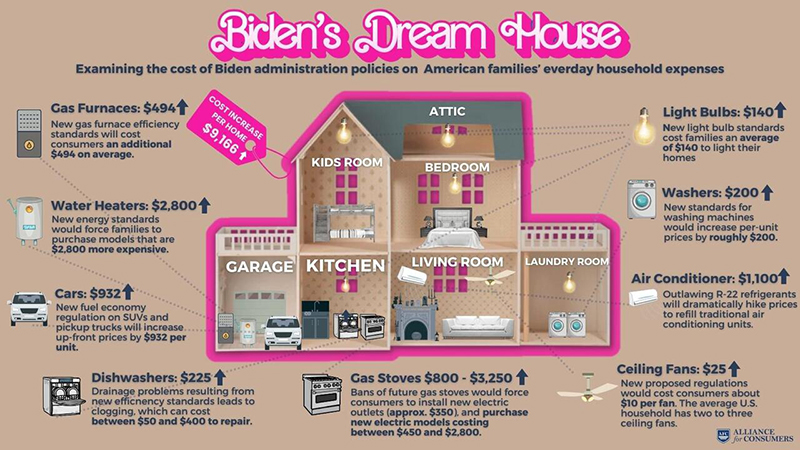Bidenomics: Typical US Family Would Pay $9,100 To Comply With ‘Dream House’ Climate Wish List
The Biden administration’s war on fossil fuels would cost the average American household more than $9,100 per year, according to a consumer watchdog.
The Alliance for Consumers took an infographic from the Biden White House titled “Biden’s Dream Home,” which proposes new energy standards for various appliances, including air conditioners, stoves, washing machines, while the Department of Energy’s so-called Unified List of appliances includes microwave ovens, dehumidifiers and pool pumps.
“Welcome to Biden’s Dream House, where the American dream just got significantly more expensive,” the group wrote on X.
According to the consumer watchdog, gas furnace efficiency standards which will “significantly reduce greenhouse gas emissions” for residences (according to the DOE), will cost consumers an estimated $494 additional on average, while dishwasher efficiency standards will cost somewhere between $50 and $400 to comply with, because the proposed rules will lead to drainage problems and clogging.
The rules targeting air conditioning units will cost around $1,100 to comply with.
This year, the Department of Energy (DOE), the Environmental Protection Agency (EPA), and the Department of Transportation (DOT) have announced a range of proposed rules that will make household appliances more expensive and, as some experts contend, are designed to force Americans to give up their current appliances.
For example, under the DOE’s proposed natural gas stove rule, an estimated 90 percent of gas stoves would have to be redesigned, with reduced performance and raise the upfront cost of stove products by around $32 million per year. –Epoch Times
New rules for water heaters will cost consumers an average of $2,800 more, while everything from ceiling fans, washing machines and light bulbs will also add to that $9,100 total.
“It’s just spreading to more and more appliances. It seems that almost everything that plugs in or fires up around the house is either subject to a pending regulation or soon will be,” Ben Lieberman, a senior fellow at the Competitive Enterprise Institute, told Fox News.
“Consumers aren’t going to like any of it. These rules are almost always bad for consumers for the simple reason that they restrict consumer choice.”


